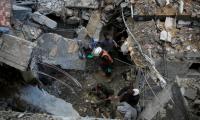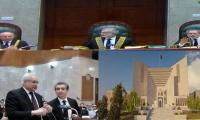ISLAMABAD: Despite challenges, there is growing cordiality in relations between Pakistan and Afghanistan, which has contributed to increased engagement between the two countries, including on the issue of refugees, which saw the Afghan Minister of Refugees and Repatriation Sayed Hussain Alemi Balkhi, in Islamabad recently.
Syed Tariq Fatemi, Special Assistant on Foreign Policy, while speaking recently in a seminar at the National Defence University, said the time had come for repatriation of refugees when the enhanced stability had given Kabul the confidence to take ownership of the return of refugees.
“The time has come for repatriation of refugees so that they should become active contributors to Afghanistan’s national rebuilding process,” he said.
Pointing to millions of these refugees who are still in Pakistan, Fatemi said this remains the “world’s largest protracted crisis even after 38 years”. He said voluntary repatriation is the only viable and sustainable solution. It will have a positive impact on the overall stability and development of Afghanistan and the region.
The UNHCR and the international community need to support Afghanistan through tangible and concrete means and resources. In the period until refugees are fully repatriated, the international community must provide relief and support to Pakistan in the form of development assistance to offset stress on our national resources.
“From the perspective of Pakistan, the key elements of this debate include the immense socio-economic, environmental, political and security consequences associated with the hosting of millions of Afghan refugees for decades. For us, the fundamental priority is their early return and reintegration in Afghanistan, for which we have worked and continue to work closely with the Government of Afghanistan, UNHCR and other relevant players,” added Fatemi.
He pointed to what he called was a “perennial lack of interest by the international community” where there was no international mechanisms for burden sharing. “Presently, a big chunk of humanitarian aid and financial assistance is being diverted towards the crisis in Europe, at the expense of neglecting other refugee situations,” pointed out Fatemi.
The lack of interest even by UNHCR is evident when it reduced its budget twice during the past two years.“The international assistance budget for the Afghan refugees in Pakistan is a tiny fraction compared to refugee situations in other parts of the world,” said Fatemi.
The way forward, he advised, was to acquire ownership and responsibility to create a conducive environment and pull factors in Afghanistan.Second, lack of capacity issues should not be used as a policy tool to further delay the returns in a situation that has become protracted.
Third, the relative improvement in the security situation in Afghanistan must be factored in.Fourth, proposals for granting temporary alternative stay arrangements to refugees are not feasible, due to Pakistan’s own socio-economic problems.
IHC registrar declined to comment on confidential matters
Asad Qaiser said that Prime Minister Shehbaz Sharif’s government had formed the caretaker government
Russia’s defence ministry said it would hold military drills including practice for the preparation and deployment...
Justice Mansoor Ali Shah remarked that there was no issue bigger issue of human rights in the country than the impact...
A ‘significant number of students’ from the IIOJ&K have been coming to Pakistan annually for medical education for...
The police conducted a special operation and traced the accused with the help of IT and other modern technologies







